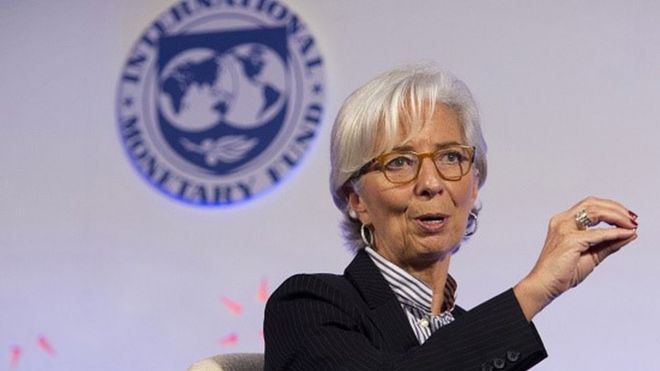 Getty Images
Getty Images
The International Monetary Fund (IMF) has once again lowered its forecasts for the world economy.
The IMF's latest World Economic Outlook now predicts global growth of 3.2% this year and 3.5% in 2017.
Launching the report, the agency's chief economist, Maurice Obstfeld, described the pace of growth as "increasingly disappointing".
The downgrades reflect what Mr Obstfeld calls a widespread slowdown across all types of economies.
He said it left the world economy more exposed to negative risks.
Before the latest downgrade, the IMF had expected global growth of 3.4% this year and 3.6% next year.
It is the second time this year that the IMF has downgraded its forecast for global economic growth.
And there is a pattern: the IMF has repeatedly downgraded its forecasts. Only a year ago, the prediction for 2016 was growth of 3.8%.
The largest downgrade of all is for Nigeria, which has been hit by the low price of crude oil, but Brazil, Russia and many others are also now expected to experience weaker performance than previously anticipated.
India's forecast, however, is unchanged and there is even an upgrade for China, reflecting strong growth in the services sector, offsetting the weakness in manufacturing.
Although the global economy has continued to recover from the financial crisis and the recession it caused, the IMF has become increasingly concerned about its lacklustre nature.
Stagnation fears
The IMF's managing director Christine Lagarde has previously described the current state of the world economy as "the new mediocre".
The new report is subtitled "Too slow for too long".
It warns of risks that could lead to results worse than the main forecast.
One danger highlighted is a return of the financial market turmoil that hit the world earlier in the year.
China's efforts to shift the national economy more towards consumer spending and services are described as something that will eventually benefit China itself and the world.
But given the country's important role in world trade, "bumps along the way" could be damaging for others.
There is a warning about "the global impact of the unwinding of prior excesses in China's economy as it transitions to a more balanced growth path after a decade of strong credit and investment growth".
There is also a concern that persistent slow growth could reduce the capacity for further growth in the future. There is a risk, the report says, of the world economy falling into widespread stagnation.
It's worth emphasising that there are only a few countries where the IMF predicts economic activity will actually decline.
Greece, yet again, is one. Brazil, which has been beset by a widespread political crisis, is forecast to see its economy shrink by 3.8%, the same amount as last year.
Russia, too, is facing another year of decline, hit by low commodity prices (notably oil) and Western sanctions over the situation in Ukraine.
No comments:
Post a Comment